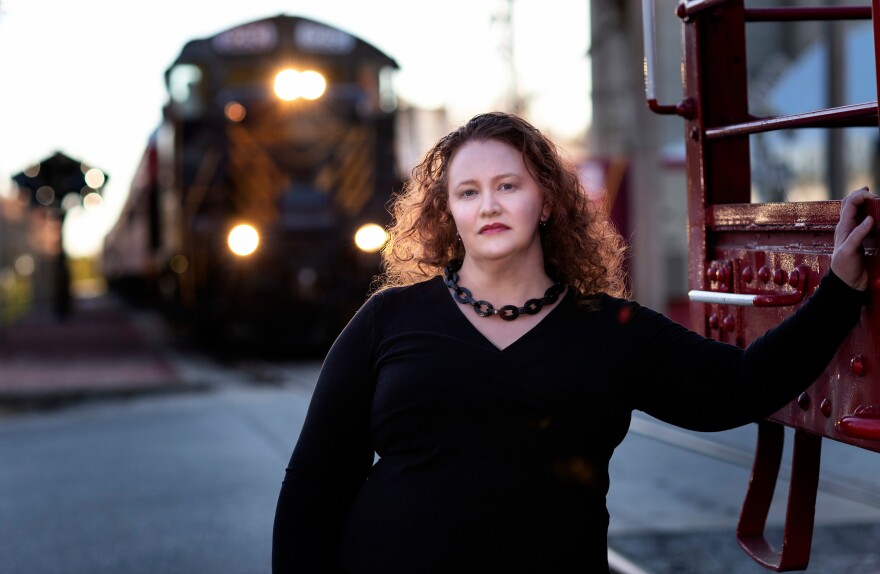A knight in shining armor with autism is the hero of Lawrence novelist Bryn Greenwood's new book, "The Reckless Oath We Made." A voice tells him to "champion" a waitress he meets in a Wichita physical therapy session, and the two careen off on a dangerous mission.
Greenwood says she didn't know whether the knight character, Gentry, would work. He's not only fascinated by Medieval literature and ancient martial arts, but his primary way of communicating is in Middle English.
"I just knew that when I heard Gentry in the writing process, that's how he sounded," Greenwood says. "He sounded like a Kansas boy who just happened to speak Middle English."
In the story, Gentry picks up his unusual language as a member of the Society for Creative Anachronism, a world-wide group of pre-17th Century aficionados. Greenwood says his development of an alternative way of speaking was true to some of the choices she sees her friends with autism make about how they present themselves.
"Everyone looks at him like he's weird, but that's just it. It gives him an extra sort of cushion where they're like, 'Okay, this guy is weird,' but he's like, 'Yes, but I'm speaking,' as opposed to: 'I look normal, but I can't get the words out,'" she says.
The woman who becomes his "lady," a Wichita waitress named Zhorzha (who goes by Zee), doesn't know what to make of him when they meet at physical therapy. She asks where he works, and he says:
"I am a vassal of the Duke of Bombardier." "'Wait, Bombardier?' I got the giggles, and even though it was probably wrong, I said, 'Verily, thou doth build flying machines?' "Some little light went on in him. He smiled and looked at me. Just for a second. "'Yea, my lady. 'Tis my duty to rivet wings upon Learjets.'"
The novel changes point of view by the chapter, and several uninterrupted pages of the odd language takes some getting used to. But Gentry's speech is a key to the book's machination, underscoring the chivalric seriousness of his commitment to caring for his lady regardless of the cost to his own life and limbs.
Zee is not a conventional lady. She deals with constant financial instability, drug trafficking and men who don't hesitate to use and abuse her. She's also from rough stock.
Her mother is a hoarder, her father was incarcerated for murder and died locked up, and her sister LaReigne is an undiscerning single mom who too easily falls in love.
When the sister is charmed by a man convicted of a hate crime, she's soon abducted while aiding his escape, and Zee's world crumbles. LaReigne had always been the reliable one in her life.

Greenwood expertly stacks circumstances and backs her characters into corners so tight that the reader can’t help but agree with every decision they make — even the one to rescue LaReigne from a Ku Klux Klan encampment.
And, in the flawless logic of the story, Gentry — eyes wide open — braves whatever fight will most benefit his lady.
If it seems iffy that a female native of rural Kansas would know enough about prison culture, drugs, poverty and hate groups to write about them convincingly, Greenwood has that possible thin spot sewn up tight as well.
"When I was a kid," she explains, "my father ran a massive crystal meth distribution organization in the Midwest. We sometimes joke and refer to him as the 'Midwest Methamphetamine Al Capone,' because he had a huge set-up, and the federal government could only get him on tax evasion charges just like Capone."
What's more, she dropped out of school at 15 years old and became self-reliant at 16.
Unlike Zee, Greenwood enrolled at Kansas State University where, in quick succession, she earned bachelor's degrees in French Literature and English, as well as a master's in creative writing.
For every page of unconventional heroism and love is one with a gem on it about the real nature of adulthood, selfless love put into practice, and what it means to "swear an oath."
Several oaths are made in the course of the story.
Greenwood says, "An oath is something more than a promise, because often an oath is almost a spiritual or ideological position where you're making a commitment to something larger than yourself."
Follow KCUR contributor Anne Kniggendorf on Twitter, @annekniggendorf.


